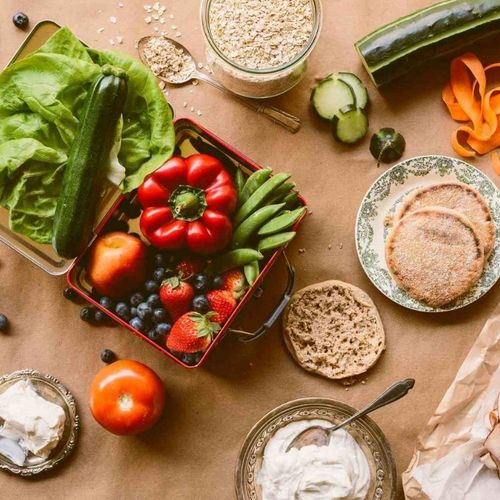For the first time, a randomized, placebo controlled study-one of the highest I standards of scientific research-has demonstrated that dietary changes can reduce cancer recurrence rates.
In this study, 2,437 women who had early stage breast cancer were randomly chosen to follow a low-fat diet(33.3 grams [g] of fat daily) or a higher-fat diet (51.3 g daily). After five years, there was more than a 20% reduction in breast cancer recurrence in the low-fat group.
The study did not prove that a low-fat diet can reduce cancer in women who did not have a history of the disease. Nor did it look at other nutritional factors, such as the consumption of fiber, fruits and vegetables, etc.
But more and more oncologists are convinced that future studies will continue to demonstrate that good nutrition can help guard against most types of malignancies.
A Cancer-Protection Plan
Diana Dyer, a registered dietitian and three time cancer survivor, has reviewed the latest studies and interviewed top researchers to create an anticancer nutrition Plan.
Even if you consume ample amounts of fiber (25 to 30g daily) and try to eat broccoli and other cruciferous vegetables as often as possible, you may be surprised to learn that there is much more you can do to curb your cancer risk.
Produce: Nine A Day
For years, US dietary guidelines recommended five daily servings of fruits and vegetables (one-half cup equals one serving). Now five to nine daily servings are recommended.
In addition to providing fiber, fruits and vegetables are the best sources of antioxidants and other plant chemicals that help prevent damage to a cell's DNA and fight the inflammation that causes normal cells to become cancerous.
What most people don't know: Only approximately 22% of Americans eat five servings of fruits and vegetables daily.
If you're getting only two daily servings but increase your intake to five daily servings, you could potentially cut your risk of some types of cancer, such as esophagus and colorectal, by 20% to 50%.
More daily servings provide even greater protection. To maximize the cancer-fighting effect, eat produce that bas the highest levels of antioxidants...
Vegetables. Kale, beets, red peppers, broccoli, spinach, sweet potatoes and corn. Try a stir-fry with olive oil and many of these veggies. ..or top a pizza with them.
Fruits. All berries, including blueberries and strawberries, plums, oranges, red grapes and pink grapefruit.
Fat: It Must Be The Right Kind
The average American diet includes 33% fat. Excessive fat-especially the saturated fat found in lunch meats, prime rib and other red meats and full-fat dairy products, such as butter, milk, cheese and sour cream-produces carcinogens that increase cancer risk.
What most people don't know: To maximize the absorption of fat-soluble-and cancer fighting-phytochemicals and nutrients found in vegetables and fruits, 16% to 18% of your diet should be from healthful fat, such as monounsaturated fat.
Helpful: To add healthful monounsaturated fat to your daily diet, use olive oil for salads, sautéing, etc.
Avoid saturated fat altogether, or follow these suggestions...
Buy only very lean meats. Limit portion size to 2 to 3 ounces (approximately the size of a deck of cards) per meal.
Use reduced-fat or fat-free dairy items.
Minimize the use of margarine as well as shortening.
Fish: It Fights Cancer, Too
The omega-3 fatty acids found in wild salmon, light tuna and other cold-water fish are known to protect the heart.
What most people don't know: Omega-3s interact with other molecules in the body to help reduce inflammatory changes that can promote cancer. Aim for two to three servings of fish weekly. Or use one to two tablespoons of ground flaxseed meal daily. It's high in alpha-linolenic acid(ALA), a beneficial type of omega-3.
Caution: Avoid blackened fish. High-heat cooking and grilling produce carcinogens that increase cancer risk. If you do grill, marinate fish or meats in vinegar, lime juice, teriyaki sauce or other marinades, and turn once a minute. This reduces the production of carcinogens by approximately 90%.
Use Herbs And Spices Often
Garlic, anise and other herbs, as well as ginger and other spices used in cooking, contain high levels of anticancer phytochemicals. To increase flavor, add herbs and spices to your foods instead of salt, sugar or fat.
What most people don't knows: Cutting or smashing fresh garlic 10 minutes before cooking preserves the high levels of its anticancer compounds.
Soy: A Little Goes A Long Way
Soybeans contain many anticarcinogenic compounds, including the phytoestrogen genistein. Phytoestrogens are plant chemicals that mimic the effects of natural estrogen-and help prevent it from causing cancerous changes in cells in both women and men.
Just one daily serving of soy (one cup of soy milk, one-half cup of tofu, one-half cup of soybeans) may reduce the risk for some breast and prostate cancers.
What most people don't know: Soy foods, such as soybeans, tofu and tempeh, are also good sources of cancer-fighting omega-3s.
Caution: Soy foods may increase the risk for hormone-sensitive cancers, such as some breast or prostate malignancies-or reduce the effects of the anticancer drug tamoxifen (Nolvadex).
Patients diagnosed with or at risk for these types of cancers should ask their doctors or a registered dietitian whether soy foods are appropriate for them.
